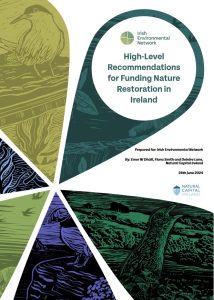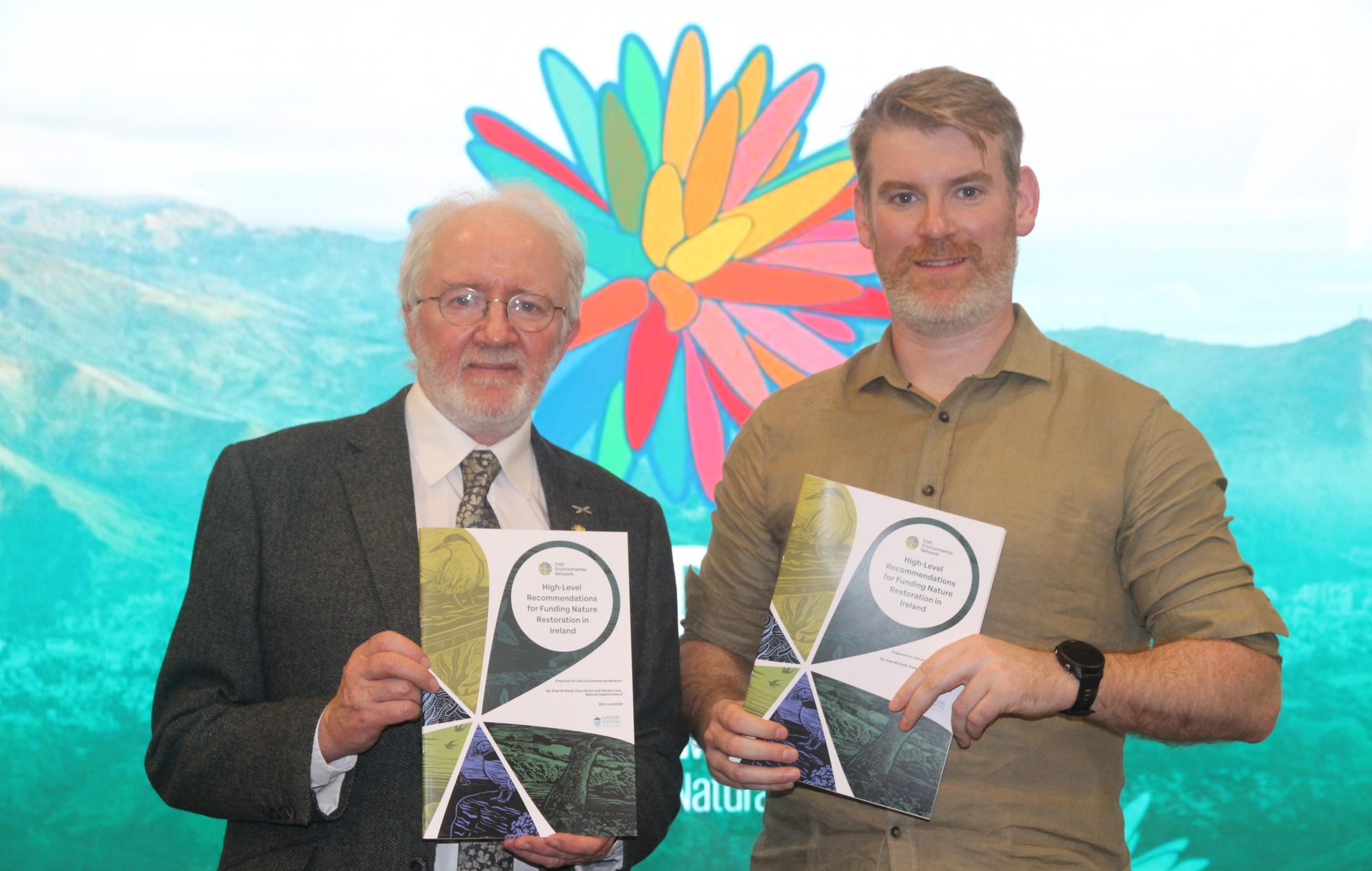Report presented to Minister Malcolm Noonan at COP16 in Cali, Colombia
A dedicated, long-term Nature Restoration Fund should be set up to support the implementation of nature and biodiversity restoration in Ireland, according to a new report by the Irish Environmental Network and Natural Capital Ireland.
The report High-Level Recommendations for Funding Nature Restoration in Ireland was officially presented to Minister Malcolm Noonan at the 16th United Nations Conference on Biological Diversity (COP16) in Cali, Colombia. COP16 comes at a critical time for global biodiversity as it aims to promote implementation of the Kunming-Montreal Biodiversity Framework (GBF), a landmark plan to halt and reverse the loss of biodiversity for 2030, adopted at COP15 in Canada.
High-Level Recommendations for Funding Nature Restoration in Ireland sets out a roadmap for funding nature and biodiversity restoration and conservation in Ireland.
Long-term thinking and long-term funding for projects is vital for nature restoration, the report finds. That’s according to a diverse group of experts from academia, business, environmental NGOs, farming, government departments, and semi-state bodies, assembled to workshop solutions to support nature restoration.
The implementation of the Nature Restoration Law, Climate Action Plan and Land Use Review will require durable and ongoing supports to enable landowners to implement sustainable land use management. Locking in funding to ensure projects continue into the future is the only way to ensure real impact, according to the report. The authors would like to see an overarching Roadmap for Nature Restoration to facilitate funded initiatives and build on past schemes which have seen successful outcomes but may not be guaranteed long-term support. Several such projects are praised in the report including the award-winning Burren LIFE Project and Roseate Tern LIFE project.
In the past, uncertainty around whether environmental schemes will last or prove beneficial has undermined trust among farmers. There must be political will and support for effective nature restoration to rebuild lost trust in agri-environmental schemes due to past issues, according to the report.
There needs to be accountability for delivering on nature restoration actions within various government departments or an independent Nature Restoration Agency to oversee action. At present, there is a siloed approach in our government and economic systems, despite every aspect of our society being underpinned by nature. This entails long-term and joined-up thinking. Mainstreaming nature-related targets across policy areas will take strong leadership.
Funding must be sustainable, scalable, ongoing and long-term with continuous monitoring and openly tracked progress. Commitment to nature restoration should not be adversely impacted by the political cycle, which is short-term, according to the report.
Continuous monitoring, reporting and built-in verification systems, as well as prompt and fair financial rewards are essential to the success of nature restoration plans. Investment is also needed to enforce existing regulations.
The report makes a number of other key recommendations:
- Investment in building capacity and expertise – More investment is needed in training, staffing, research and expertise for the coordination of an effective delivery of National Restoration Plan (NRP). The NPWS is working on the NRP for Ireland but requires more resources. A large and rapid investment in training and upskilling is needed, including in the short-term to recruit experts from abroad to facilitate rapid training here.
- Incorporate education – there is a need to incorporate education on biodiversity loss and nature restoration within our education system, from primary, secondary, through to third level. A graduate programme in practical nature restoration for ecologists (or other relevant skills), similar to an apprenticeship would be a good long-term action. On-the-ground learning is essential. This will allow students and graduates to consider different paths in their educational journey that they may not have considered before.
- Scale up success – Rapid scaling up of best-practice restoration projects with ongoing supports. Scaling up nature restoration requires well-designed pilot projects which can then be expanded. The implementation of the NRL, Climate Action Plan and Land Use Review require long-term support to enable landowners to implement sustainable land use management.
- Mainstream biodiversity – Invest in engagement and awareness raising. Nature restoration should be mainstreamed by a) embedding biodiversity and nature restoration in the general public awareness and b) clear messaging that the biodiversity loss and climate crises are inextricably linked and need to be addressed in a holistic way.
Dr Emer Ní Dhúill, Lead Researcher, Natural Capital Ireland said: “NCI was delighted to have the opportunity to collaborate with IEN on this report and discuss funding nature restoration with a wide range of experts. In terms of an overarching Nature Restoration Roadmap, the report highlights the need to build expertise in nature restoration, and fund the development of natural capital accounting at different scales in Ireland. It’s a tool to track changes in ecosystem services over time, and ensure our natural resources are valued across the board by making nature’s contributions to our society, culture, health and wellbeing more visible. In this regard, we welcome the recent announcement by Minister Noonan of setting up an independent Nature Advisory Committee which is a step in the right direction.”
Aoife Ní Lochlainn, Policy and Advocacy Manager at the Irish Environmental Network said: “The Government has committed to implementing a Nature Restoration Plan for Ireland in response to the EU’s Nature Restoration Law – but there remains a big question, how will we fund and who will coordinate this ambitious plan? We need a roadmap to nature restoration. A rapid reform of elements of infrastructure that have failed to deliver in the past is needed, and a robust structure put in place to ensure long-term security for those on the ground who are ready to act now. This entails long-term and joined-up thinking as well as certainty and sustainable funding for those being asked to participate in restoration projects and schemes.”
Fintan Kelly, IEN Agriculture and Land-use Policy Officer said: “Ireland is fortunate in that there have been many innovative pilot projects which established best-practice examples of conservation action on the ground. With the right political will and investment these can be scaled up giving farmers and communities the tools they need to lead in Ireland’s response to biodiversity collapse and climate breakdown.”
Ends
Read the full report https://ien.ie/funding-nature-restoration-in-ireland-report/
Photo: Minister Malcolm Noonan and Fintan Kelly IEN Agriculture and Land-use Policy Officer at COP16, Cali, Colombia


